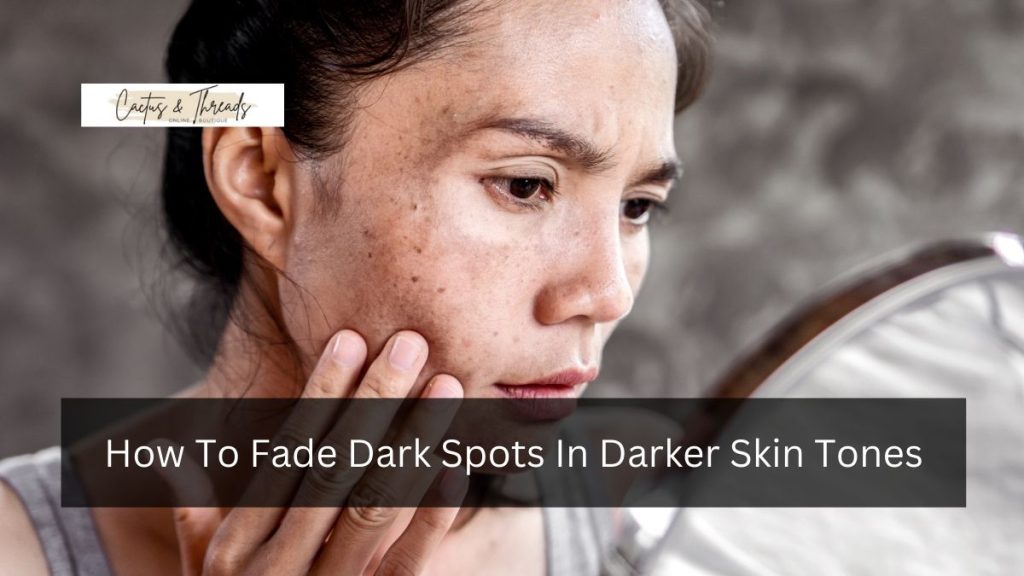
Dark spots, also known as hyperpigmentation, are a common skin concern for people with darker skin tones. Whether caused by acne, sun exposure, or hormonal changes, dark spots can be persistent and challenging to treat. However, with the right approach, you can reduce their appearance and achieve clearer, more even-toned skin.
In this article, we’ll explore effective strategies and skincare products that can help fade dark spots on darker skin tones.
Understanding Dark Spots in Darker Skin Tones
Hyperpigmentation occurs when certain areas of the skin produce more melanin than usual, resulting in darkened spots or patches. For those with darker skin tones, hyperpigmentation can be more noticeable due to the increased melanin production. These spots can develop from various factors, including:
- Acne scars: Dark spots often appear after an acne breakout, leaving behind post-inflammatory hyperpigmentation.
- Sun exposure: Overexposure to the sun can lead to sunspots, which are more prominent in individuals with darker skin.
- Hormonal changes: Pregnancy, birth control, or hormonal imbalances can cause melasma, resulting in brown patches on the skin.
- Skin irritation or injury: Cuts, burns, or any skin trauma can lead to pigmentation changes as the skin heals.
While dark spots are harmless, they can affect confidence and the overall appearance of your skin. Thankfully, there are several ways to fade them over time.
1. Use Brightening and Exfoliating Ingredients
Certain skincare ingredients are known for their ability to fade dark spots and brighten the skin. These include:
Vitamin C
Vitamin C is a powerful antioxidant that helps inhibit melanin production, making it one of the most effective ingredients for brightening dark spots. Regular use of a vitamin C serum can help lighten hyperpigmentation and even out skin tone.
Niacinamide
Niacinamide, also known as Vitamin B3, is an anti-inflammatory ingredient that can reduce the appearance of dark spots and improve skin elasticity. It works by inhibiting melanin transfer to the skin’s surface, thus reducing pigmentation.
Alpha Hydroxy Acids (AHAs)
AHAs like glycolic acid and lactic acid help exfoliate the skin by removing dead skin cells. This process helps promote skin regeneration and can gradually fade dark spots over time. AHAs are especially helpful in removing surface discoloration.
Retinoids
Retinoids, such as retinol, speed up skin cell turnover and encourage the shedding of dead skin. By increasing the turnover rate, retinoids can help fade dark spots more effectively. However, retinoids should be used with caution, as they can cause irritation in some individuals, especially when used in combination with other active ingredients.
Salicylic Acid
Salicylic acid is a beta-hydroxy acid (BHA) that penetrates the skin’s pores, making it especially effective for treating acne scars. It gently exfoliates the skin, reducing pigmentation and preventing future breakouts.
2. Sun Protection Is a Must
One of the most important steps in fading dark spots is protecting your skin from further sun damage. Sun exposure can worsen hyperpigmentation and make dark spots more prominent.
- Use sunscreen daily: Even if you’re indoors or it’s cloudy outside, applying a broad-spectrum sunscreen with SPF 30 or higher is crucial. Sunscreen helps prevent further darkening of existing spots and shields your skin from harmful UV rays.
- Reapply every two hours: If you’re out in the sun for an extended period, make sure to reapply sunscreen every two hours to ensure constant protection.
- Wear protective clothing: Sunglasses, hats, and long sleeves can also help protect your skin from direct sun exposure, further preventing dark spots.
3. Consider Chemical Peels
Chemical peels are a more advanced treatment for fading dark spots, and they work by removing the outer layer of skin to reveal fresh, even-toned skin underneath. For darker skin tones, it is essential to consult a dermatologist before opting for chemical peels, as certain chemicals may cause irritation or discoloration if not used properly.
There are different types of chemical peels, including:
- Glycolic acid peels: These work by exfoliating the skin and promoting collagen production, helping to fade dark spots over time.
- TCA peels: Trichloroacetic acid peels are deeper and can treat more stubborn pigmentation.
- Salicylic acid peels: These are excellent for individuals prone to acne and acne scars.
4. Try Home Remedies with Natural Ingredients
Natural ingredients can also help brighten dark spots and soothe the skin. While these remedies may take longer to show results, they are a gentler alternative for those with sensitive skin.
Aloe Vera
Aloe vera has anti-inflammatory properties that can help reduce the appearance of dark spots and promote skin healing. Applying fresh aloe vera gel to dark spots can soothe irritation and lighten pigmentation over time.
Lemon Juice
Lemon juice contains natural citric acid, which has mild bleaching properties. It can be used as a spot treatment for dark spots, but it should be used cautiously, as it can cause skin irritation if exposed to the sun.
Turmeric
Turmeric contains curcumin, which is known for its skin-brightening and anti-inflammatory properties. You can create a turmeric paste and apply it to dark spots to reduce pigmentation.
Honey and Cinnamon
Both honey and cinnamon are natural exfoliants and have antibacterial properties. Mixing honey with cinnamon and applying it to dark spots can help fade them over time, especially for those prone to acne scarring.
5. Be Consistent and Patient
Fading dark spots doesn’t happen overnight, and results will vary depending on your skin type and the severity of the pigmentation. Consistency is key when using products with active ingredients, and it may take several weeks or months to see significant improvement. Don’t give up early—regular, diligent care can make a noticeable difference.
6. Consult a Dermatologist for Professional Treatments
If your dark spots are persistent and do not respond to over-the-counter products, consulting a dermatologist is an option. A dermatologist can recommend stronger treatments like:
- Laser treatments: Lasers such as fractional CO2 or intense pulsed light (IPL) can target and break up pigmentation at a deeper level, helping to fade dark spots faster.
- Microneedling: This involves tiny needles that create micro-injuries in the skin, stimulating collagen production and helping with skin tone and texture.
Conclusion
Dark spots may be a common concern, but with the right treatments and care, you can significantly reduce their appearance. By incorporating effective ingredients, practicing sun protection, and considering professional treatments, you can fade dark spots and achieve a clearer, more even complexion.
Remember that consistency and patience are essential, so take care of your skin and enjoy the glowing results over time!







